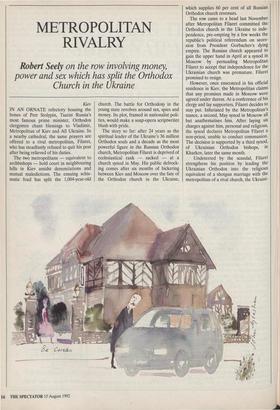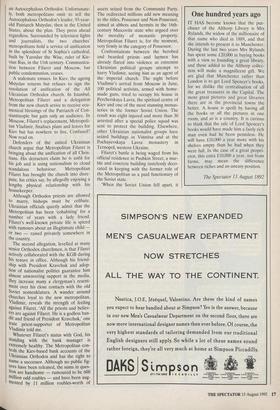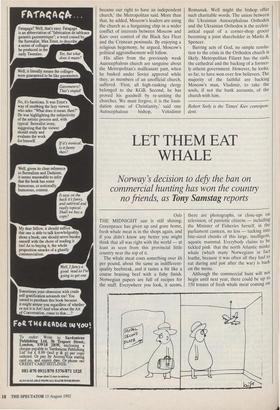METROPOLITAN RIVALRY
Robert Seely on the row involving money,
power and sex which has split the Orthodox Church in the Ukraine
Kiev IN AN ORNATE refectory housing the bones of Petr Stolypin, Tsarist Russia's most famous prime minister, Orthodox clergymen chant blessings to Vladimir, Metropolitan of Kiev and All Ukraine. In a nearby cathedral, the same prayers are offered to a rival metropolitan, Filaret, who has steadfastly refused to quit his post after being relieved of his duties.
The two metropolitans — equivalent to archbishops — hold court in neighbouring hills in Kiev amidst denunciations and mutual maledictions. The ensuing schis- matic feud has split the 1,004-year-old church. The battle for Orthodoxy in the young state revolves around sex, spies and money. Its plot, framed in nationalist poli- tics, would make a soap-opera scriptwriter blush with pride.
The story so far: after 24 years as the spiritual leader of the Ukraine's 36 million Orthodox souls and a decade as the most powerful figure in the Russian Orthodox church, Metropolitan Filaret is deprived of ecclesiastical rank — sacked — at a church synod in May. His public defrock- ing comes after six months of bickering between Kiev and Moscow over the fate of the Orthodox church in the Ukraine, which supplies 60 per cent of all Russian Orthodox church revenues.
The row came to a head last November after Metropolitan Filaret committed the Orthodox church in the Ukraine to inde- pendence, pre-empting by a few weeks the republic's political referendum on seces- sion from President Gorbachev's dying empire. The Russian church appeared to gain the upper hand in April at a synod in Moscow by persuading Metropolitan Filaret to accept that independence for the Ukrainian church was premature. Filaret promised to resign. However, once ensconced in his official residence in Kiev, the Metropolitan claims that any promises made in Moscow were agreed under duress. At a conference of his clergy and lay supporters, Filaret decides to stay put. Infuriated by the Metropolitan's stance, a second, May synod in Moscow all but anathematises him. After laying six charges against him, personal and religious, the synod declares Metropolitan Filaret a non-priest, unable to conduct communion. The decision is supported by a third synod, of Ukrainian Orthodox bishops, in Kharkov, later the same month.
Undeterred by the scandal, Filaret strengthens his position by leading the Ukrainian Orthodox into the religious equivalent of a shotgun marriage with the metropolitan of a rival church, the Ukraim- an Autocephalous Orthodox. Unfortunate- ly, both metropolitans omit to tell the Autocephalous Orthodox's leader, 93-year- old Patriarch Mstyslav, then in the United States, about the plan. They press ahead regardless. Surrounded by television lights and journalists, the two churches' metropolitans hold a service of unification in the splendour of St Sophia's cathedral, built by Yaroslav the Wise, ruler of Kie- vian Rus, in the 11th century. Communica- tion between Filaret and Moscow, bar public condemnation, ceases.
A stalemate ensues. In Kiev, the ageing Mstyslav returns but refuses to sign the resolution of unification of the All Ukrainian Orthodox church. In Istanbul, Metropolitan Filaret and a delegation from the new church arrive to receive ecu- menical blessings of the Patriarch of Con- stantinople but gain only an audience. In Moscow, Filaret's replacement, Metropoli- tan Vladimir, finalises plans and leaves for Kiev but has nowhere to live. Confused? Now read on.
Defenders of the united Ukrainian church argue that Metropolitan Filaret is bringing about the unification of all Chris- tians. His detractors claim he is unfit for his job and is using nationalism to cloud scandalous behaviour. Metropolitan Filaret has brought the church into disre- pute, his critics say, by allegedly enjoying a lengthy physical relationship with his housekeeper.
Although Orthodox priests are allowed to marry, bishops must be celibate. Ukrainian officials quietly admit that the Metropolitan has been 'cohabiting' for a number of years with a lady friend. Filaret's well-known private life is spiced With rumours about an illegitimate child — or two — raised privately somewhere in the country.
The second allegation, levelled at many senior Orthodox churchmen, is that Filaret actively collaborated with the KGB during his tenure in office. Although his friend- ship with President ICravchuk and adop- tion of nationalist politics guarantee him almost unwavering support in the media, they increase many a clergyman's resent- ment over his close contacts with the old Soviet nomenklatura. A wander around churches loyal to the new metropolitan, Vladimir, reveals the strength of feeling against Filaret. 'All the priests and believ- ers are against Filaret. He is a godless ban- dit and friend of President Kravchuk,' one irate priest-supporter of Metropolitan Vladimir told me.
Whatever Filaret's status with God, his standing with the bank manager is extremely healthy. The Metropolitan con- trols the Kiev-based bank accounts of the Ukrainian -Orthodox and has the right to name a successor. Although no public fig- ures have been released, the sums in ques- tion are handsome — rumoured to be 600 Million odd roubles — and have been aug- mented by 11 million roubles-worth of assets seized from the Communist Party. The redirected millions add new meaning to the titles, Possessor and Non-Possessor, aimed at abbots and hermits in the 16th- century Muscovite state who argued over the morality of monastic property. Metropolitan Filaret is, for the moment, very firmly in the category of Possessor.
Confrontations between the berobed and bearded priests and laymen has already flared into violence as extremist Ukrainian political groups attempt to harry Vladimir, seeing him as an agent of the imperial church. The night before Vladimir's arrival from Moscow in June, 100 political activists, armed with home- made guns, tried to occupy his house in Percherskaya Lavra, the spiritual centre of Kiev and one of the most stunning monas- teries in the former Soviet Union. The result was eight injured and more than 30 arrested after a special police squad was sent to protect the building. Elsewhere, other Ukrainian nationalist groups have seized buildings in Vinnitsa and at the Pochayevskaya Lavra monastery in Ternopol, western Ukraine.
Filaret's battle is being waged from his official residence in Pushkin Street, a mar- ble and concrete building tastelessly deco- rated in keeping with the former role of the Metropolitan as a paid functionary of the Soviet state.
'When the Soviet Union fell apart, it became our right to have an independent church,' the Metropolitan said. More than that, he added, Moscow's leaders are using the church as a bargaining chip in a wider conflict of interests between Moscow and Kiev over control of the Black Sea Fleet and the Crimean peninsula. By enjoying a religious hegemony, he argued, Moscow's political aggrandisement will follow.
His allies from the previously weak Autocephalous church are sanguine about the Metropolitan's malfeasant past, when he basked under Soviet approval while they, as members of an unofficial church, suffered. 'First, all high-ranking clergy belonged to the KGB. Second, he has proved his goodwill by re-uniting the churches. We must forgive, it is the foun- dation stone of Christianity,' said one
Autocephalous bishop, Volodimir Romanuk. Well might the bishop offer such charitable words. The union between the Ukrainian Autocephalous Orthodox and the Ukrainian Orthodox is the ecclesi- astical equal of a corner-shop grocer becoming a joint shareholder in Marks 84 Spencer.
Barring acts of God, no simple resolu- tion to the crisis in the Orthodox church is likely. Metropolitan Filaret has the cash, the cathedral and the backing of a former- ly atheist government. However, he looks, so far, to have won over few believers. The majority of the faithful are backing Moscow's man, Vladimir, to take the souls, if not the bank accounts, of the church with him.
Robert Seely is the Times' Kiev correspon- dent.




















































 Previous page
Previous page